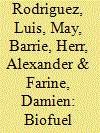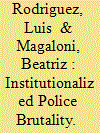| Srl | Item |
| 1 |
ID:
103329


|
|
|
|
|
| Publication |
2011.
|
| Summary/Abstract |
The promotion and use of renewable energy sources are established priorities worldwide as a way to reduce emissions of Greenhouse Gases and promote energy security. Australia is committed to reach a target of 350 ML of biofuels per year by 2010, and incentives targeted to producers and consumers have been placed. These incentives include zero excise until 2011 for the ethanol produced in Australia and gradual increase of the taxation rates reaching the full excise of 0.125 AUD per litre by 2015. This paper analyses the viability of the second generation ethanol industry in the Green Triangle, one of the most promising Australian regions for biomass production, by comparing the energy adjusted pump prices of petrol and the produced ethanol under different taxation rates and forecasted oil prices. Major findings suggest that under the current conditions of zero fuel excise and oil prices around 80US$ per barrel ethanol production is viable using biomass with a plant gate cost of up to 74 AUD per ton. Moreover, the forecasted increase in oil prices have a higher impact on the price of petrol than the increased ethanol excise on the pump price of the biofuel. Thus, by 2016 feedstock with a plant gate cost of up to 190 AUD per ton might be used for ethanol production, representing a flow of 1.7 million tons of biomass per year potentially mitigating 1.2 million tons of CO2 by replacing fossil fuels with ethanol.
|
|
|
|
|
|
|
|
|
|
|
|
|
|
|
|
| 2 |
ID:
175276


|
|
|
|
|
| Summary/Abstract |
How can societies restrain their coercive institutions and transition to a more humane criminal justice system? We argue that two main factors explain why torture can persist as a generalized practice even in democratic societies: weak procedural protections and the militarization of policing, which introduces strategies, equipment, and mentality that treats criminal suspects as though they were enemies in wartime. Using a large survey of the Mexican prison population and leveraging the date and place of arrest, this paper provides causal evidence about how these two explanatory variables shape police brutality. Our paper offers a grim picture of the survival of authoritarian policing practices in democracies. It also provides novel evidence of the extent to which the abolition of inquisitorial criminal justice institutions—a remnant of colonial legacies and a common trend in the region—has worked to restrain police brutality.
|
|
|
|
|
|
|
|
|
|
|
|
|
|
|
|